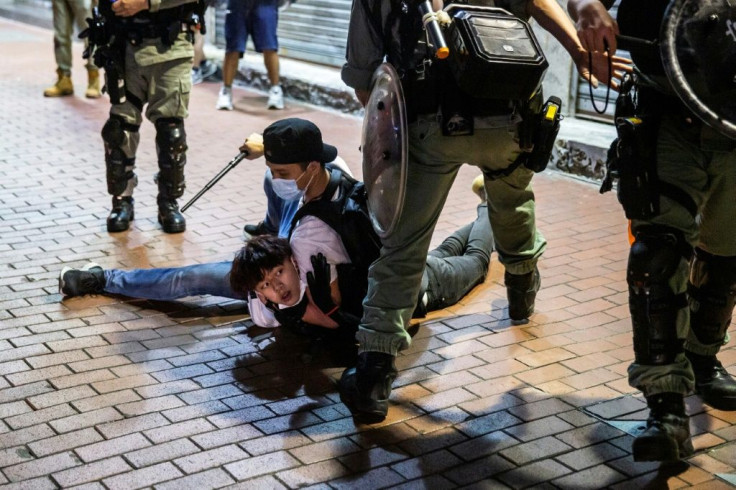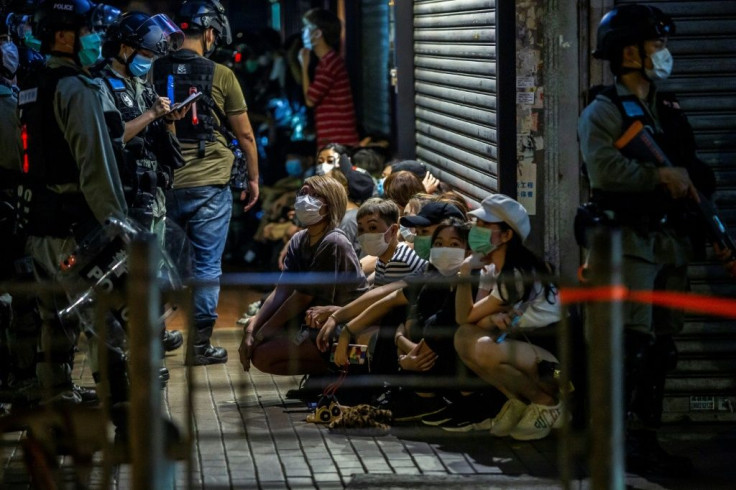230 Arrested In Hong Kong's First Major Protests Since Virus Began

Hong Kong police arrested hundreds of people during weekend democracy protests -- including a 12-year-old boy -- officials said Monday, in the first major political unrest since the coronavirus outbreak began.
The disclosure came as the financial hub's pro-Beijing leader Carrie Lam vowed to overhaul the city's education system, arguing its liberal studies curriculum helped fuel last year's huge protests.
On Sunday -- two days after virus restrictions on gatherings were eased and bars and gyms allowed to reopen -- riot police chased flash-mob protesters through multiple shopping malls.
They later used pepper spray and batons against protesters, bystanders and journalists in the district of Mong Kok.
Police said 230 people between the ages of 12 and 65 were arrested on various charges including unlawful assembly, assaulting a police officer and failing to produce identity documents.
Others were also fined for breaching anti-coronavirus measures banning more than eight people gathering in public.
Hospital authorities said 18 people received treatment for injuries.
In an interview with pro-government Ta Kung Pao newspaper published Monday, Lam described the current secondary school programme as a "chicken coop without a roof" and said her government would soon unveil their plans.
"In terms of handling the subject of liberal studies in the future, we will definitely make things clear to the public within this year," she said.
Her comments are likely to inflame those Hong Kongers who fear Beijing is chipping away at the freedoms that make the city a major international draw as political tensions rise once more.
Sunday's protests invoked memories of the seven straight months of often-violent youth-led pro-democracy protests last year, when millions hit the streets.

More than 8,000 people have been arrested so far -- around 17 percent of them secondary school students.
For the last four months mass arrests and the coronavirus ushered in a period of enforced calm.
But with the finance hub successfully tackling its COVID-19 outbreak -- and social distancing measures easing -- unrest is bubbling up again.
In the New Year, Lam vowed to heal the divisions coursing through Hong Kong, but her administration has offered little in the way of reconciliation or a political solution.
She has resisted calls for universal suffrage or an independent inquiry into the police's handling of the protests.
With the backing of Beijing, her government is pushing a bill that outlaws insulting China's national anthem and leading pro-establishment figures are lobbying for an anti-sedition law.
The government says new laws are needed to curb snowballing support -- especially among younger Hong Kongers -- for democracy and greater autonomy from China.
Opponents say the laws will cut back on free speech and do little to heal the city's festering divides.
Education is becoming another political battleground.
Hong Kong has some of Asia's best schools and universities with academic freedoms unseen in mainland China.
Liberal studies was introduced in 2009 as a way to foster critical thinking with secondary schools allowed to choose how they teach it.
But it has become a bugbear for Chinese state media and pro-Beijing politicians who have called for more patriotic education.
© Copyright AFP 2024. All rights reserved.





















